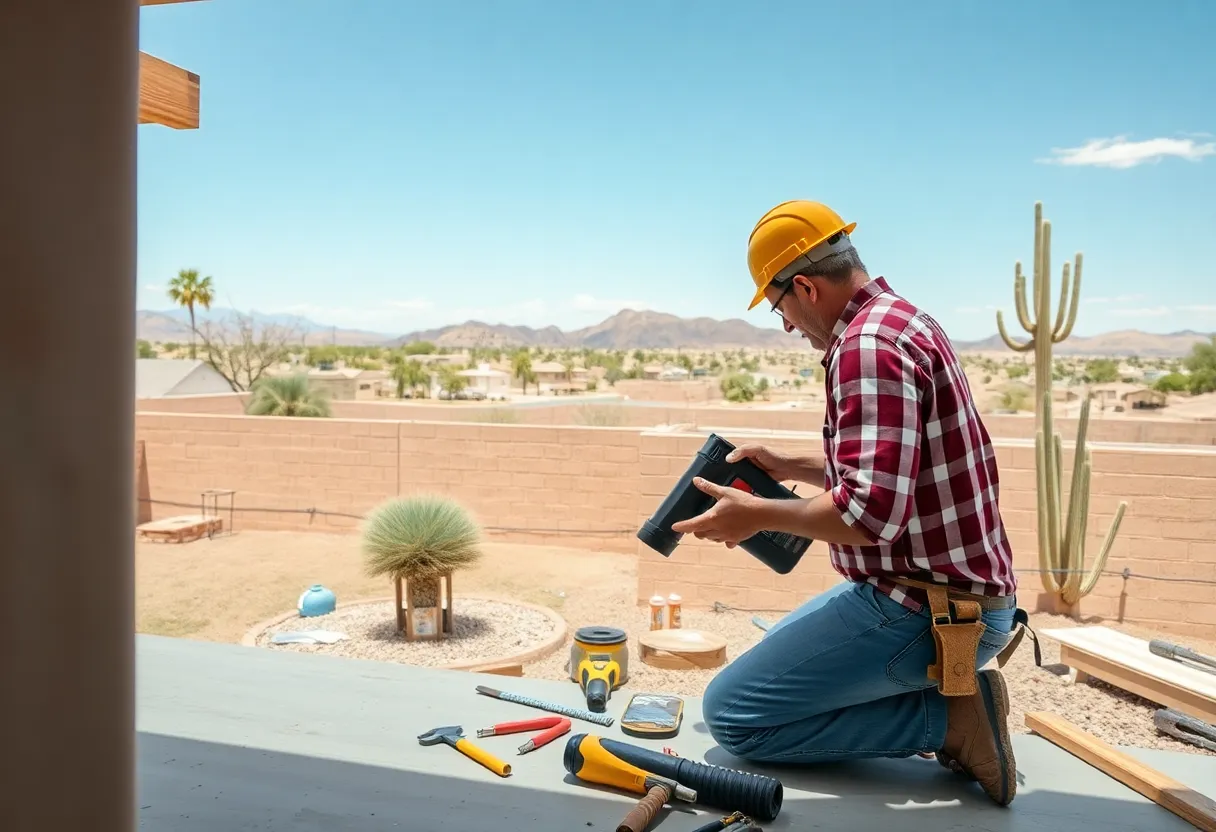What Are the Best Local Resources for Phoenix Homeowners Planning a DIY Renovation?
City of Phoenix Housing Repair Programs
The City of Phoenix offers Housing Repair Programs through its Neighborhood Services Department, providing essential financial support for critical home repairs. These programs focus on repairs or replacements of HVAC systems, plumbing, electrical components, and addressing property hazards. They are particularly valuable for homeowners seeking affordable ways to upgrade their residences while ensuring safety and compliance. Eligibility is determined through a household assessment process, which evaluates income, property condition, and overall need. Homeowners interested in participating should consult the official city website for current guidelines and application procedures.
City of Phoenix Residential Building Resources
The Planning & Development Department provides comprehensive guidance for homeowners planning residential renovations. Resources include detailed instructions on adding rooms, developing hillside properties, installing fences, water heaters, and obtaining necessary permits. The SHAPE PHX portal simplifies access by consolidating forms, checklists, and tutorials. It helps ensure that DIY projects adhere to local zoning regulations and building codes, reducing the risk of legal complications. Homeowners can also find step-by-step tutorials to navigate permit applications smoothly and avoid common pitfalls.
Local Home Improvement Workshops and Meetups
Community engagement enhances DIY renovation efforts through knowledge sharing. The Phoenix Home Renovation Meetup Group is a notable example that connects residents interested in home upgrades like kitchens, bathrooms, and outdoor spaces. While there are no upcoming scheduled meetings currently, these groups serve as platforms for exchanging tips, discovering local suppliers, and gaining inspiration. Attending in-person or virtual meetups fosters a supportive network of experienced DIYers who can troubleshoot challenges and share practical insights.
Online DIY Platforms and Resources
Extensive online resources expand DIY options beyond local networks. Platforms like Hometalk host over 140,000 tutorials covering myriad topics—from cabinet refinishing to gardening. These guides offer detailed, step-by-step instructions suitable for various skill levels. They include visuals, tips for sourcing materials, and recommendations for tools. Access to such content helps homeowners plan projects with greater confidence and reduces dependence on costly professional help. Engaging with online communities fosters continuous learning and innovation in home improvement.
Local Handyman Services and Consultations
While DIY work is cost-effective, certain tasks benefit from professional expertise. Local handyman services, such as Handyman Connection of Phoenix, provide a practical solution for specific projects. They offer expert assistance with tasks like installing fixtures, electrical wiring, or cabinetry. Even if homeowners prefer a hands-on approach, consulting professionals ensures safety, compliance, and quality. These services often include project assessments, quotes, and scheduled work, making complex repairs more manageable. Having a trusted contractor network is invaluable for troubleshooting unforeseen issues during renovation projects.
Home Improvement eBooks and Databases
Digital libraries and scholarly repositories provide in-depth knowledge vital for successful DIY renovations. Gale’s home improvement databases contain comprehensive eBooks on architectural design, building materials, zoning laws, and technical techniques. Homeowners can utilize these resources to deepen their understanding before starting projects, ensuring informed decision-making. Accessing credible, well-researched content helps avoid costly mistakes and aligns DIY efforts with local regulations.
Essential Tools and Safety Practices
Equipping oneself with the right tools is foundational for safe and effective DIY renovations. Key items include a cordless drill, hammer, level, tape measure, utility knife, screwdriver set, and adjustable wrench. Personal protective equipment (PPE), such as safety glasses, gloves, and dust masks, protects against common hazards. Following safety protocols—like proper lifting techniques and electrical safety—reduces injury risks. Investing in quality tools and PPE yields better results and enhances safety during hands-on work.
Beginner-Friendly DIY Projects
Starting with simple, achievable projects can build confidence quickly. Tasks such as updating cabinet hardware, installing peel-and-stick backsplash tiles, or repainting rooms can dramatically improve aesthetics without extensive skills. These projects serve as practical stepping stones toward larger renovations. They involve minimal tools and materials, yet offer significant visual impact, motivating homeowners to deepen their DIY journey.
Planning and Project Management Tools
Effective project planning streamlines renovation efforts. Digital tools like templates, checklists, and timelines help organize tasks, set realistic deadlines, and monitor progress. Using project management software assists in resource allocation, budget tracking, and scheduling. Well-structured plans prevent delays and ensure efficient use of time and resources. Clear documentation simplifies coordination with contractors or suppliers if needed and reduces stress during complex projects.
Local Home Improvement Retailers
Local hardware stores in Phoenix are invaluable hubs for DIYers. Knowledgeable staff can recommend compatible materials and tools, provide demonstrations, and suggest cost-effective solutions. Stores also often host workshops, offering practical training on specific skills such as tiling, drywall installation, or electrical basics. Building relationships with store personnel can lead to better product selections and insights into local code requirements.
Professional Consultation Services
For tailored guidance, professional consultation services ensure that DIY plans are feasible and compliant. Phoenix-based companies like Home Renovations offer free or paid consultations, reviewing project scope, providing technical advice, and offering estimates. These sessions help prevent costly errors and clarify whether projects require permits or special skills. Even when largely DIY, consulting experts offers peace of mind.
Home Improvement Shows and Media
Visual media serves as inspiration and education for DIY enthusiasts. Renovation TV shows, YouTube channels, and online magazines showcase innovative ideas, end-to-end walkthroughs, and expert tips. Watching these media increases familiarity with techniques, tools, and common challenges, enabling homeowners to approach projects more confidently. Visual step-by-step guidance is especially beneficial for tackling unfamiliar tasks.
Local Libraries and Community Centers
Community hub resources support ongoing education in home improvement. Many libraries and centers host workshops, seminars, and access to reference materials on topics like carpentry, plumbing, or energy efficiency. Participating in these events broadens skills and connects residents with local experts. These venues often offer access to tools and reference guides for home DIY projects at no or low cost.
Online Communities and Forums
Engagement in specialized online forums provides real-time advice from seasoned DIYers. Platforms such as Reddit’s HomeImprovement community, Houzz, and dedicated home renovation forums enable homeowners to pose questions, share project photos, and exchange insights. These communities often provide solutions to common issues, resource recommendations, and encouragement, fostering a sense of shared progress and learning.
Local Trade Schools and Workshops
Enrollment in trade school classes enhances technical expertise. Phoenix institutions frequently offer courses in carpentry, electrical work, masonry, and plumbing. These programs combine classroom instruction with hands-on practice. Skilled instructors teach safety, code compliance, and advanced techniques, equipping DIYers for more ambitious projects or the management of complex repairs.
Home Improvement Magazines and Publications
Magazines dedicated to home design and renovation serve as continuous sources of current trends, innovative ideas, and professional advice. They provide step-by-step guides, product reviews, and inspirational layouts, helping homeowners stay updated on best practices. Subscribing or browsing these publications regularly informs project choices and introduces new techniques.
Local Building Codes and Regulations
Compliance with local building codes is essential for legal and safety reasons. Phoenix’s Planning & Development Department provides detailed resources and assistance for understanding permit requirements. Ensuring projects meet these regulations prevents future complications, fines, or unsafe conditions. Researching code specifics—such as setbacks, electrical standards, and zoning—before starting work is critical for legal compliance.
Budgeting and Financial Planning
Accurate budgeting prevents financial strains during renovations. Homeowners should account for materials, tools, and unforeseen expenses. Setting aside a contingency fund of at least 10-15% of the project budget mitigates risks. Using digital budget trackers or spreadsheets simplifies expense management and ensures projects stay financially feasible.
Time Management and Scheduling
Realistic scheduling minimizes delays. Breaking projects into phases with clear deadlines helps track progress. Allocating extra time for unexpected issues is advisable. Maintaining a project timeline supports steady workflow and ensures completion within desired timeframes, reducing frustration and overlapping commitments.
Post-Renovation Maintenance
Ongoing maintenance preserves renovation quality. Regular inspections, cleaning, and prompt repairs protect investments. Developing checklists for routine upkeep ensures longevity. Educating oneself on basic maintenance tasks helps in early detection of issues, preventing costly repairs later.
Environmental Considerations
Incorporating sustainability into renovations benefits the environment and reduces energy expenses. Choosing eco-friendly materials, installing energy-efficient appliances, and composting waste align with green practices. Using reclaimed or recycled materials also minimizes ecological impact, contributing to a healthier home and planet.
Legal and Insurance Aspects
Legal compliance involves obtaining permits and adhering to zoning laws. Ensuring that homeowner’s insurance policy covers renovation work is vital. Consulting legal or insurance professionals helps clarify liabilities and coverage, protecting against potential damages or injuries during a DIY project.
Networking with Local Professionals
Building a network of trusted local contractors and specialists offers support when needed. Even in primarily DIY projects, having professionals on call improves safety and project quality. Participating in trade shows and local events facilitates connections for future collaborations or emergency consultations.
Staying Informed and Educated
Continuous learning through books, courses, and industry updates ensures current knowledge. Attending workshops and staying active in online communities fosters skill development. Staying informed about new tools and building practices enhances DIY capabilities and project outcomes.
Celebrating Your Achievements
Recognizing project milestones promotes motivation. Sharing successes with friends and online communities builds confidence. Documenting renovations through photos or blogs can inspire others and create a portfolio for future endeavors.
Seeking Feedback and Reviews
Constructive feedback helps identify areas for improvement. Sharing project outcomes enhances community knowledge and fosters collaborative growth. Positive reviews also build reputation for DIY skills, opening opportunities for future projects.
Planning Future Projects
Reflection on completed projects informs planning for subsequent renovations. Identifying successful strategies and lessons learned streamlines future efforts. Setting new goals motivated by past experiences ensures ongoing progress in home improvement.
Frequently Asked Questions
What permits are needed for DIY home renovations in Phoenix?
Permits vary depending on the project scope. Typically, additions, structural changes, electrical, or plumbing work require permits. Homeowners should consult the city’s Planning & Development Department for specific requirements.
Can I get financial assistance for home repairs in Phoenix?
Yes, the city offers Housing Repair Programs providing financial aid for essential repairs, especially for qualifying low- to moderate-income homeowners.
What safety equipment should I use for DIY renovations?
Protective gear such as safety glasses, work gloves, dust masks, and ear protection are essential. Following proper safety protocols helps prevent injuries during renovation projects.
Where can I find tutorials for DIY home improvement?
Online platforms like Hometalk, YouTube, and specialized home improvement forums provide extensive tutorials suitable for various skill levels.
How do I ensure my DIY renovation complies with local codes?
Review city zoning and building codes through the Phoenix Planning & Development Department. Obtain necessary permits before starting work to ensure compliance.
Key Features of Local Resources for Phoenix DIY Renovations
| Resource Type | Primary Benefit | Availability |
|---|---|---|
| City Housing Repair Programs | Financial assistance for home repairs | Official city programs, eligibility-based |
| Permitting & Building Resources | Guidance on permits, codes, and project planning | Online portals and city offices |
| Workshops & Meetups | Community support, direct learning | Local meetups, community centers |
| Online Platforms | Step-by-step tutorials and inspiration | Accessible anytime via internet |
| Local Contractors & Professionals | Expert advice, specialized services | Contractor networks, consultations |
| Trade Schools & Classes | Hands-on skill development | Educational institutions in Phoenix |
Author: STAFF HERE PHOENIX WRITER
The PHOENIX STAFF WRITER represents the experienced team at HEREPhoenix.com, your go-to source for actionable local news and information in Phoenix, Maricopa County, and beyond. Specializing in "news you can use," we cover essential topics like product reviews for personal and business needs, local business directories, politics, real estate trends, neighborhood insights, and state news affecting the area—with deep expertise drawn from years of dedicated reporting and strong community input, including local press releases and business updates. We deliver top reporting on high-value events such as the Waste Management Phoenix Open, Cactus League Spring Training, and Arizona State Fair. Our coverage extends to key organizations like the Greater Phoenix Chamber of Commerce and Visit Phoenix, plus leading businesses in technology and healthcare that power the local economy such as Intel and Banner Health. As part of the broader HERE network, including HERETucson.com, we provide comprehensive, credible insights into Arizona's dynamic landscape.





